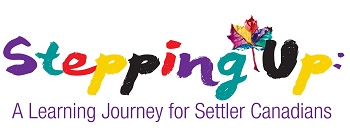Featured Work

Stepping Up: A Learning Journey for Settler Canadians
The United Nations Educational, Scientific, and Cultural Organization (UNESCO) describes the goals of citizenship education as nurturing respect, building a sense of common humanity, and helping learners become responsible and active global citizens (https://en.unesco.org/gced). History shows that these values of mutual respect and common humanity have rarely guided the relationships between Indigenous and non-Indigenous peoples in Canada. Citizenship education has the potential to play a central role in changing these relationships.
Horizons Community Development Associates developed this citizenship education course as a unique response to the TRC Calls to Action. We recognize that we are at a ‘moment of possibility’ and that a desire to ‘do the right thing’ is emerging within non-Indigenous populations of Canada. But this desire is often impeded by confusions and uncertainties: non-Indigenous people often wonder what we can possibly do; we think we don’t know enough; we fear that we might say or do the wrong thing and make matters worse. This course gives us a chance to talk together, to address difficult issues, to share our hopes and fears and to learn new ways of thinking, being, feeling, and acting. It provides an opportunity for non-Indigenous people to learn how to ‘Step-Up’ to their reconciliation responsibilities.
By taking part in Stepping Up, participants will:
- Recognize the need for non-Indigenous people to ‘do their own work’ towards reconciliation.
- Understand that truth and justice must precede reconciliation.
- Explore the fundamental assumptions of a Euro-Western World View.
- Examine some principal devices of the Canadian colonization process (historical and current).
- Consider the ways in which adopting a ‘Settler identity’ might influence their thoughts, feelings, and actions.
- Strengthen their commitment and ability to engage in Truth and Reconciliation initiatives.
- Identify their future learning goals.
Course Structure
The 12-hour course can be offered in a variety of formats: (a) six, two-hour sessions; (b) three four-hour sessions (c) two six-hour sessions (d) a 3- day residential session.
Course Content
- Session 1: Session 1: Who are We and Why are we Here
- Session 2: Exploring a Western World View
- Sessions 3 & 4: Foundational Myths and Truths of the Canadian State
- Session 5: Engaging in Reconciliation: We are all Treaty People?
- Session 6: Engaging in Reconciliation: Moving Forward
